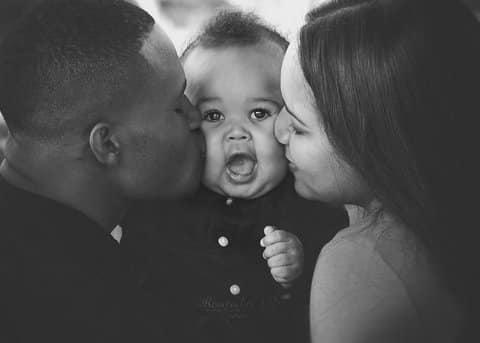
31 Dec Don’t Force Mixed-Race People ‘Inside a Box of Stereotypes’

When this baby grows up, don’t tell him to pick a side and “act his race.” (“Baby Kisses” by taylormackezie via Flickr / CC BY-SA 2.0 license)
Commentary, Ronvel Sharper
Let’s face it, our country has a complicated history with race, and even though things have evolved, that history still affects us today.
Part of the trouble comes with trying to label people according to their skin color and asking what it means to be a certain race.
Back in the day, people tried to legally quantify race — you know, the three-fifths clause, the one-drop rule. Sure, we left those laws behind, but that kind of thinking isn’t completely gone. We still try to make mixed-race people pick a side and shun the other while subtly and overtly letting them know they don’t belong to either one.
But race doesn’t make us who we are. There are many aspects to one’s identity: Race, ethnicity, culture, hobbies — even our preferences — all play a part in who we are. And how do biracial folks feel about their races, anyway? What do they think of what society thinks? Do they even care?
Some people end up suffering from “racial imposter syndrome.” For the uninitiated, “imposter syndrome,” in general, is “a psychological condition that is characterized by persistent doubt concerning one’s abilities or accomplishments accompanied by the fear of being exposed as a fraud despite evidence of one’s ongoing success,” according to Merriam-Webster.
Now, imagine that, but instead of worrying about the validity of your own accomplishments, you worry if you’re even a real *insert race here* person. Many of these insecurities or thoughts can take the form of, “Oh, I don’t fit the idea of what a “insert race here* person looks like” or some of your own race treating you as if you are a foreigner among your own group.
Trust me when I say I know how stressful this can be. I’m Black, but I’m light-skinned, so growing up, I was constantly accused of “acting white” when I didn’t want to do the things that were seen as cool or “accurate” to what my race is “supposed” to be doing at my age.
I am almost certain that many other folks of color can relate to my experience.
As Dr. Martin Luther King Jr. himself wished, we should judge each other not based on our racial makeup, but rather, the content of our character. Alas, with superficial and stuck-up societal norms, most people can’t truly be themselves out of fear of society rejecting them and turning them into outcasts.
>>>Read: Despite the Racial Guessing Game, Being Mixed Is the Best of Both Worlds
My friend Annie Rosales, who has Italian and Salvadorean roots, told me that people have told her countless times, “act your race,” something she feels is extremely racist.
“Others are trying to fit me inside a box of stereotypes of how they see Latins or Europeans,” she said. “I’ve mainly been told this about my Latin heritage — that I don’t look or act Latin, therefore, ‘You can’t be Latin.’”
To Rosales, 19, this shows how our society “must see race in every sense of a person.” If you step out of society’s racial boundaries, “then you are somehow less a part of their community.”
She also said the culture a person is born into does shape who they are — but it’s not everything. “To define someone’s entire personality based on being their race [is] a pointless venture that will do nothing but limit one’s self.”
I absolutely agree that seeing someone entirely through the lens of their race is a surefire way to be ignorant of their individuality — their desires, their thoughts, their issues, their everything. You’ll essentially be seeing a caricature of someone.
And that leads to stereotypes, which leads to ignorance, which leads to fear, which leads to violence, if not worse.
>>>Read: Being Mixed Gives Me an Open Mind and Empathy
Some people, like my friend Cristian Rodriguez, 25, have an easier time navigating their racial identity. He is African American and Latin, and he doesn’t feel like he doesn’t “belong” in either of those groups.
Like Rosales, he gets told he doesn’t “act his race.” Despite this, he still feels proud of who he is and says he’s simply going to keep being himself.
Mixed-race folks have always been around, and their numbers are growing. In the 2020 census, 33.8 million people in this country identified as “two or more races.” That number was 9 million at the last census — that’s a 276% jump in just 10 years. All those folks have rich bloodlines that make up a unique story for each and every one of them in the book of life. To ignore that for the notion that anyone is some stereotype or caricature because of their skin color is an insult not only to us but also to those who came before us. You are not what society wants you to be — you are you.
This resource is supported in whole or in part by funding provided by the State of California, administered by the California State Library in partnership with the California Department of Social Services and the California Commission on Asian and Pacific Islander American Affairs as part of the Stop the Hate program. To report a hate incident or hate crime and get support, go to CA vs Hate.






David Simon Bergmann
Posted at 04:18h, 13 JanuaryMy granddaughter SOPHIE is a mixed-race baby, half japanese and half caucasian.
DAVID SIMON BERGMANN